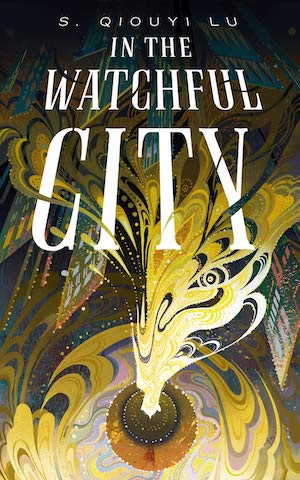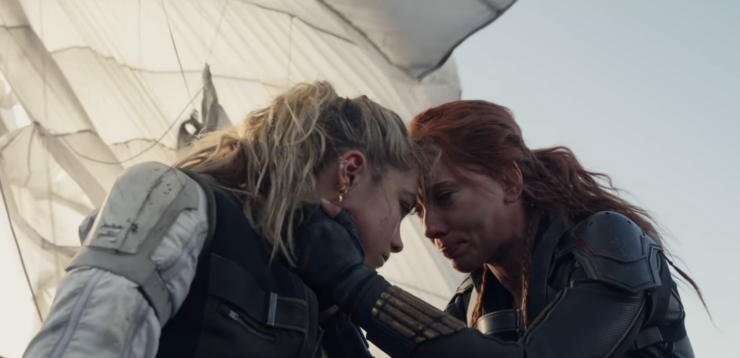Fans were introduced to the Marvel Cinematic Universe’s iteration of Natasha Romanoff in 2010, and not a year went by when the studio wasn’t asked the same sad question: Where’s our Black Widow movie?
It took too long to get here. Thankfully, it has been worth the wait, and now the only sadness that lingers is the bitter knowledge that we won’t be getting more of these films. Because Black Widow proves that Natasha always had what it took to hold up her own corner of the MCU and then some—it just took the assembling (ahem) of a team that cared enough to tell her story.
[Minor spoilers for Black Widow.]
Set directly after the events of Captain America: Civil War, Black Widow focuses on the first steps Natasha Romanoff (Scarlett Johansson) took in hiding out after the ratification of the Sokovia Accords. On the run from the U.S. government and separated from her friends, she instead winds up pulled back into family drama, explicitly the Red Room kind. A wayward package brings her back into the radius of Yelena Belova (Florence Pugh), another defected Black Widow in need of her help; it turns out that while Natasha believed she had destroyed the Widow program entirely before fully defecting to SHIELD, it only morphed under a new methodology.
Buy the Book


In the Watchful City
But there’s more at stake here than simply the future of the Widow program, and it’s all bound up in familial ties: Yelena was once “assigned” to be Natasha’s little sister in a deep undercover mission in Ohio when they were small children. For three years, they were a family, parented by Alexei Shostakov (David Harbour) and Melina Vostokoff (Rachel Weisz), and Yelena was too young to know about the ruse until it was abruptly brought to an end. This offers different stakes to the whole mission: an opportunity for sisters to reconnect and decide if the family they were forced to pretend at means anything to them as adults. Their reunion and a chance to meet back up with their former guardians power the film and make for instant character ties that never feel forced or confusing. While the casting certainly helps here (you can’t get much better than Harbour and Weisz for dysfunctional spy parents), it also helps that the film knows to lean into this group dynamic and enjoy the ride.
In addition to showcasing a superhero that Johansson has been subtly and expertly building upon for years, the film also serves as an introduction to Pugh’s Yelena, a character who is set to take Natasha’s place on the Avenger’s team as we move into new phases of the MCU. On that front, the movie does an excellent job, and the character is (thankfully) wonderfully scripted. Pugh has always been an superb actor, and this part suits her to a tee; Yelena is quite different from Natasha, and that’s part of what makes their dynamic so fun, every inch the brash and outspoken little sister she deserves. While never diverting the spotlight away from Natasha for too long, the audience gets the chance to love Yelena, and that will only serve her going forward in this sweeping universe. While it can be irritating to always see the strings for future projects dangling, it’s always great being introduced to characters who you instantly want to see more of.
Because we’re only getting one film instead of the usual three (and I will harp on that until the end of time), there’s a surprising amount of room to breathe. The usual formula of Marvel movies often over-relies on major action set pieces that are rarely unique enough to warrant the time spent on them. With Widow, we get a surprising amount of space devoted to banter and conversations, to the unpacking of decades worth of baggage, to the questions swirling around Natasha Romanoff’s past and what she’s been silently bringing to the table throughout the entire run of the MCU. We’ve wanted to know more, and have only ever been given hints—the buffet feels like an indulgence, and simultaneously never enough.
Another exciting aspect of Widow centers on the action, but more importantly on the fact that most of the action sequences within this film are entirely fought by women without any commentary to that effect. While there were moments of Marvel’s first female-led sojourn (Captain Marvel) that occasionally felt a little too much like the studio waving its hands around going “Look! We did it! Tell us we’re doing a great job!”, Black Widow channels its namesake by just getting the job done. There’s no need to ask for applause if you’ve done the work and know you’ve got in on lock.
The messaging around female power gets a tiny bit overwrought and ham-fisted in certain places, but when it decides to pull back and offer subtlety, it tells a smart and satisfying story while barely seeming to try. In fact, the overall effortlessness of the film is perhaps its greatest quality, something that many MCU movies struggle with these days. So much gets devoted to trying to convince the audience that they want to watch a given tale that the whole exercise winds up feeling too much like homework and not enough like fun. Black Widow manages to balance character development, character introduction, spy antics, continuous action, and a thriller’s pace while somehow making the whole ordeal look easy. Oh this? the film says. This is just something I had in the back of the closet and threw on. Does it work? And we all grin and nod and shove some more popcorn into our faces because we don’t want to miss a frame.
And even though not every moment highlighting issues around the portrayal of female power always plays strong, Black Widow also works to unpack all the moments within the MCU when Natasha was done wrong by. There are numerous shoutouts to poor scripting choices and plot lines that left fans cold, sometimes framed as jokes and other times unloaded upon with extreme prejudice. This is a movie that wants us to know that “red in the ledger” was a goofy way to talk about guilt; that there’s a reason what Loki said to Natasha on the helicarrier hit too close to the mark; that doing a superhero pose on landing is something that all of Natasha’s friends do, but it means something different when she does because she knows she draws the eye. Even better, it annihilates Joss Whedon’s awful Ultron scene where Natasha talks about her forced sterilization at the hand of the Red Room by allowing for more than one manner of telling that story—essentially acknowledging that all women feel and speak differently about their bodies and how they have been abused, and that not every conversation around trauma takes the form of a tearful, vulnerable confession.
What’s more impressive, perhaps, is the fact that the film never once needs another Avenger’s presence to make it work. There are wonderful little nods here and there to events and moments that have been alluded to in other films (including a fun diversion to Budapest that shows off how she and Clint Barton passed their time while stuck there). But while her other Avengers teammates often rely on the presence of extra heroes to make their stories sing, Natasha does more than fine on her own. She has a rich history, populated by events that we’ve never seen and people who we’ve never even met. She is a true spy’s spy, and we’ll never know the full measure of her because that’s how the game is played.
There are questions that the film is asking around the ability to choose for one’s self and also around families and how they function. These questions dovetail nicely into the idea of chosen families, and the film is largely a rumination on that concept without getting cloying on the subject. The question of what makes a family, how even the ones we build are imperfect, how we can support each other despite our own foibles, is what Black Widow means to tackle. There are some who might argue that this rumination helps make up for Natasha’s fate in Avengers: Endgame—unfortunately, it doesn’t make the narrative choice of her later death clearer, better, or easier to swallow. If anything, this movie serves to prove that Natasha Romanoff deserved a long, heroic life, surrounded by the people she loved, and taught, and in many ways saved.
So we finally got our Black Widow movie, and the true disappointment is in knowing that we don’t get another, at least not with Natasha at the helm. But hopefully this film will do well and prove to Marvel Studios and Disney that the next time they’re asked to take a risk on something that isn’t a talking raccoon, they’ve got no excuse to delay.
Emmet Asher-Perrin would also love a movie or show that’s just Natasha’s family sitting around the dinner table being awkward. You can bug them on Twitter, and read more of their work here and elsewhere.










